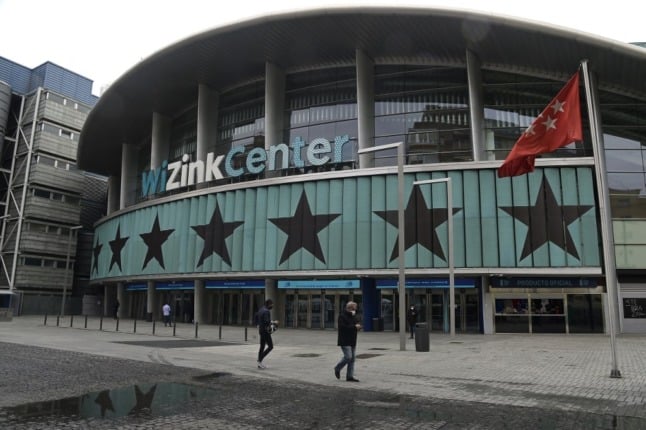“What happened to my second dose?,” is the question on the minds of tens of thousands of Madrid residents in July 2021.
Regional authorities in Spain’s capital have decided to delay the second Pfizer vaccine for countless madrileños, past the initially stated and recommended 21 days after the first jab.
The wait could be 28 days or even 42 days after the first jab for those waiting to complete their Covid inoculation with the BioNTech/Pfizer vaccine.
Madrid has a system similar to Catalonia whereby citizens don’t get their appointment for the second dose in advance but rather receive a notification via text message 24 to 48 hours before it’s their turn, meaning many people in the capital have been waiting in vain after three weeks to be called up, unsure about how to plan their summer holidays around it.
Hundreds of disgruntled residents have even decided to go to Madrid’s public hospitals to demand their second dose, or called up the 900 102 112 health hotline, but none have succeeded.
Quejas en el Hospital 12 de Octubre de personas que exigen la segunda dosis de #Pfizer Te lo contamos en el #TNFS
Síguelo aquí en 📡 DIRECTO https://t.co/0IdP8AspEU, con @VOrtega511 pic.twitter.com/2G0RyE1AnK
— Telenoticias Telemadrid (@InformativosTM) July 17, 2021
Why is this happening?
The regional government headed by the divisive Isabel Díaz Ayuso links the problem to the “strategy of (Spain’s national Health) Ministry” and the “shortage of vaccines”, although no other region in Spain has reported similar incidents.
Madrid’s regional health director Enrique Ruiz Escudero on Tuesday told journalists that the lack of vaccine deliveries has meant that the region can’t “move forward” in terms of administering first doses, having stopped offering new appointments the previous week.
“We received fewer vaccines than what we needed to complete our objectives,” he claimed.
Recibimos menos vacunas de las necesarias para cumplir con los objetivos.
Para avanzar en la inmunización y controlar la pandemia, hemos de insistir en la vacunación, pero hay que tener más vacunas.
Foro Salud en @NewEconomyForum pic.twitter.com/qPfNjOsmWj
— Enrique Ruiz Escudero (@eruizescudero) July 19, 2021
“Pfizer vaccine stocks are being reserved for already confirmed second doses,” Escudero later tweeted.
But now there are apparently not enough vials to complete second Pfizer vaccines for everyone else that’s waiting either.
Escudero indicated that the region has 350,000 doses from Pfizer allocated for the first vaccine, 120,000 from Moderna for first and second doses, about 120,000 from the single-dose Johnson & Johnson inoculation and 32,000 from AstraZeneca for second doses (after returning 200,000 to the Spanish Health Ministry due to a lack of target population).
Madrid opposition leader Mónica García has said it was a “joke” for Ayuso’s party to claim there was a shortage of vaccines in the region when there is a higher percentage of unused vials in Madrid than anywhere else in Spain except Melilla.
READ MORE: Spain to receive no more AstraZeneca vaccines and donate remaining doses
Second dose delays are affecting the 40 to 49 age group in particular, with only 40.6 percent having received their full vaccination treatment in Madrid compared to 59 percent on average across all of Spain.
But the pause in first doses also means many young people, who are the main group affected by the fifth wave of the coronavirus in Spain, are not getting the partial immunity needed to curb infections.
Madrid’s health director called for “patience” and argued that delaying the second dose of the Pfizer vaccine past 21 days “doesn’t reduce the efficacy”.
He also stressed that Madrid has administered more first vaccines than most other Spanish regions – 75 percent to its eligible population – but according to Spain’s National Health Ministry this is where part of the problem may lie, stating that Ayuso’s government gave too many first doses and now has a shortfall of second doses as a result.
“All the regions knew that in June we achieved with great effort an advance of the Pfizer doses and they all made the correct planning of how to administer the first doses, being aware that in July vaccine availability would return to the previous levels,” Spain’s Secretary of State for Health Silvia Calzón said in response to criticism from Madrid.
“They shouldn’t be having problems administering second doses with the stock they will receive in the coming weeks”.
There’s also the fact that back on April 14th Escudero wrote to the national health department headed by Carolina Darias to ask for second doses of Pfizer and Moderna to “be completed 42 days” after the treatment started, suggesting it’s been part of Madrid’s vaccine plans all along.
Spain’s national Health Ministry bases its recommendation on second doses on what the European Medicines Agency states – 21 days for Pfizer and 28 days for Moderna – but the US’s Centre for Disease Control has previously reported that “the second dose can be received up to six weeks or 42 days after the first dose, if necessary”.
For many people in Madrid, their regional government’s claim that they’re pausing first doses to “avoid delays” for second doses isn’t credible, given that this isn’t what’s happening in practice.
This vaccine fiasco also represents the latest chapter in a year of political wrangling between the socialist-led national government and the right-wing Popular Party in charge in Madrid, constantly at odds over their handling of Covid-19 restrictions.



 Please whitelist us to continue reading.
Please whitelist us to continue reading.
Member comments